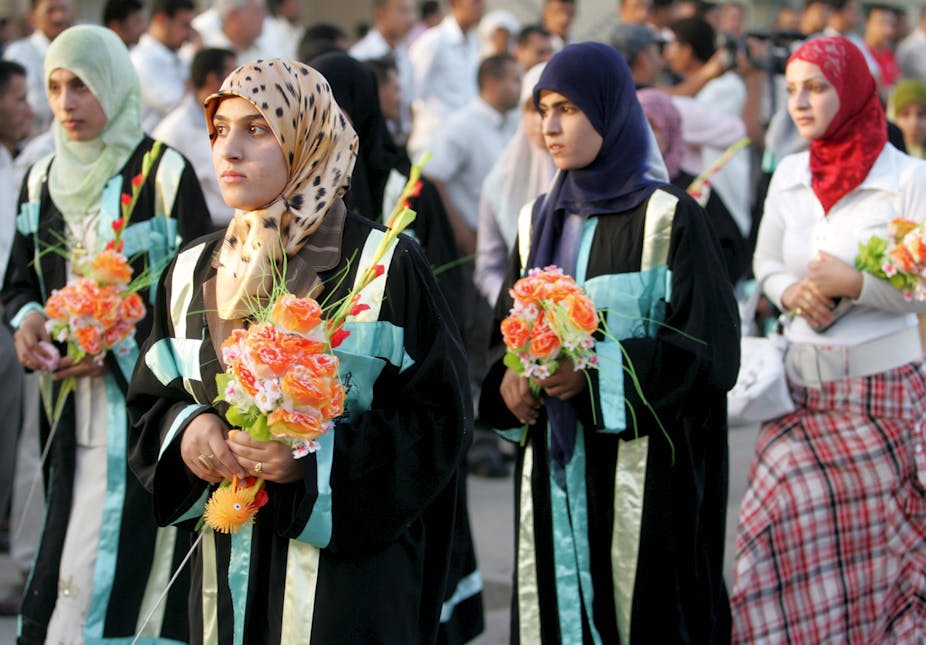As Iraqis prepare to go to the polls to vote in parliamentary elections ten years on from the invasion, the country is a lifetime away from where things used to be. Iraq’s education system, once one of the best in the Middle East with a series of flourishing universities in the 1960s and 1970s, has suffered dramatically over the past few decades.
Infrastructure problems, funding shortfalls, academic brain drain and violence have all played their part in the depletion of qualified academics and a general loss of faith in the once-great system.
As Bristol academic Eric Herring argues: “Iraqis tend to see themselves proudly as coming from a society that was the cradle of civilization in its ancient contributions to the development of writing, legal systems, libraries, mathematics, astronomy, medicine and technology.”
Rather than looking to the past, Iraq is looking to the future and treating the coming decade as an opportunity to rebuild its university foundations to educate a new post-conflict generation.
If you build it, they will come
There are a series of reforms going on in the Iraqi higher education system. In 2013, minister of higher education and scientific research, Ali al-Adib, proposed a plan to build 13 new universities and 28 colleges throughout Iraq, supported by UNESCO, the World Bank and UNICEF.
The cost associated with the pilot projects of this ambitious plan is estimated as close to US$200m. In addition, a five-year scholarship plan launched in 2012, will support up to 10,000 students pursuing graduate degrees internationally.
Meanwhile, in the Kurdistan region of Iraq, a new PhD Pathway, supported by the British Council’s DelPHE project, overhauled the process and delivery of the PhD and promoted international engagement, collaboration and student exchange.
There is considerable interest within Iraq to push for international partnerships, joint degrees and student exchanges.
The recent establishment of the International Centre for Natural Resources Research by the University of Leicester and Soran University in Kurdistan is an example of this move towards transnational education. But there is scope for further international partnerships, especially in light of a government commitment to focus on natural resource management and sustainable human development.
Reputation management
Despite the expense, the building of new universities is not a problem – the challenge is in how, and with what, you fill them. Qualified teaching staff, engaged and active researchers, motivated and dedicated students must all be supported by transparent and consistent processes, administrative support and must be driven by strategic leadership.
One key objective facing Iraq with this level of expansion is to reinvigorate its academic reputation. The years of conflict and the aftermath of reconstruction have caused a dramatic impact in terms of resources, access, reputation and output.
The university system is very hierarchical and largely relies upon senior experience and decision making. This can naturally cause bottle-necks and frustration among the younger and less experienced academics.
There is significant training on offer, both internally and internationally, but often the selection criteria for involvement is constrained by existing power structures and distinctions. The system must incorporate the experience and stability of senior colleagues and the enthusiasm and international links of those more junior.
Managing expectations
The challenge for Iraq’s universities as they expand is to build locally but look internationally. However, exchanging a broken system for one that suits the needs of others cannot be the goal here.
One issue, central to any international collaboration, involves the common perception that partnership and collaboration automatically equals quality.
The tendency to follow a “shopping-cart” approach to delivering a course or training, limits the real value of international engagement. What may look like a quick fix does not necessarily provide long-term solutions to real problems.
Adopting a new system or approach without an understanding or knowledge of how it works limits success. International partners going into Iraq must be mindful of such perception and ensure that both sides benefit from the engagement.
The considerable cost and time involved in creating and maintaining a successful international partnership in Iraq must be tempered by a long-term view of how we measure success.
Iraq may currently lack sufficient resources and capacity, but what it does not lack is will. The drive to reform, rebuild and join the globalised academic community is evident throughout the country. The process will naturally take time, but the previous decade of turmoil has the potential to be replaced by a new era of development, opportunity and educational reform.

